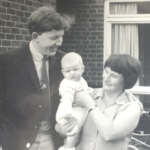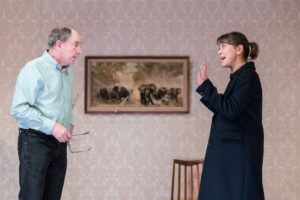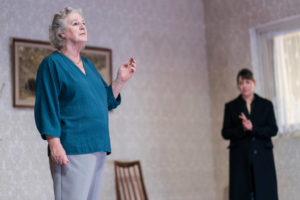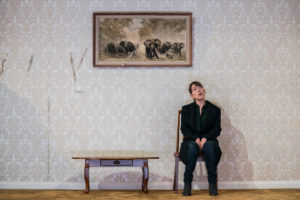Pam Ferris & Toby Jones perfect in audio play about a mother with dementia
★★★★★

I’ve listened to audio plays all my life, mainly on BBC radio, so, believe me, it means a lot when I say I have never heard a better audio play than Mark Ravenhill’s Angela. It works perfectly as audio because it’s about his mother who had dementia and it takes place almost entirely inside her head.
Why, in the throes of dementia, does she forget she has a son, why does she think her husband is trying to kill her, why does she become violent? In the course of the play, we hear what led her there: her memories of her unpleasant childhood, her ambitions to be an actor, her miscarriages and the profound effect of losing her first baby, a girl.
There is much about how her love of theatre and encouragement of her son Mark is at odds with her working class background and the cause of conflict with her husband and her sister. Central is a moment from Mark’s childhood, when we see how she copes and doesn’t cope with her son. Together they see the ballet film The Tales Of Beatrix Potter. Mark becomes obsessed with dancing the role of Jemima Puddleduck. Angela identifies with Jemima, someone who is threatened by the world and has her children killed or taken away.
It’s sad, painful even, but not depressing. It’s beautifully written and sensitively performed. We gain insights into dementia- the disorientation, the imagined world, the confusion of past and present- but what is fundamentally important is that Angela remains a person, a human being with thoughts and memories and feelings.
And there’s the gentleness with which her son- and her husband- interact with her is heartwarming.
The dialogue and the acting in Angela are pitch perfect. I can’t speak to the art of getting it right but I’ve heard many times when it’s been wrong, the dialogue stilted, the acting stagey. But here when the older Angela says, for example, ‘I bled the girl away. I was made all wrong’, it sounds natural and is spoken with understated passion by Pam Ferris.
The other cast members also get the balance of clarity and believability just right. Toby Jones as her gentle husband, Matti Houghton as the younger Angela gradually beaten down by life, Jackson Laing as the young Mark bright, loving but oblivious to his mother’s anguish even as she supports him, Joseph Millson as the adult Mark, caring, and understanding how her past shaped her and himself. ‘We’ve all got muddled, imagined things, got angry with each other,’ he says.
‘Natural’ is rarely achieved naturally, so Polly Thomas, a hugely experienced director of radio plays, deserves her share of the credit for making this one work.
The sound too is just right. The minimalist piano music by Alexandra Faye Braithwaite is dreamlike and ever so slightly disorientating, as befits a story that shows the effects of dementia.
There’s much more to Mark Ravenhill’s cleverly constructed play: Angela’s mother, a parent who undermines her child; her relationship with her sister who has two boys and is insensitive as to how that might make the (at that time) childless Angela feel; the attachment of blame; the devastating hole left by a miscarriage and the way it is unexpectedly filled by her love of acting when two people with dementia meet.
The play begins and ends with a middle aged man taking a ballet class. No prizes for guessing who this is.
I appreciate this play may mean more to those of us who have experienced at first hand the effects of dementia on a loved one but I can assure you that, even if you haven’t, you will be moved by this play and be thinking about it for a long time afterwards.
Angela is part of a new season of audio plays from Sound Stage, co-produced by Pitlochry festival theatre and the Edinburgh Royal Lyceum in collaborartion with naked Productions. Still to come are new plays by John Byrne, Timberlake Wertenbaker, Roy Williams and more.
Angela was played on 26–28 March and 1 & 2 April 2021 as part of pitlochryfestivaltheatre.com It can be heard on BBC Sounds.
Click here to watch the review on the YouTube channel One Minute Theatre Reviews
Paul received a free ticket from the producers to review Angela.


